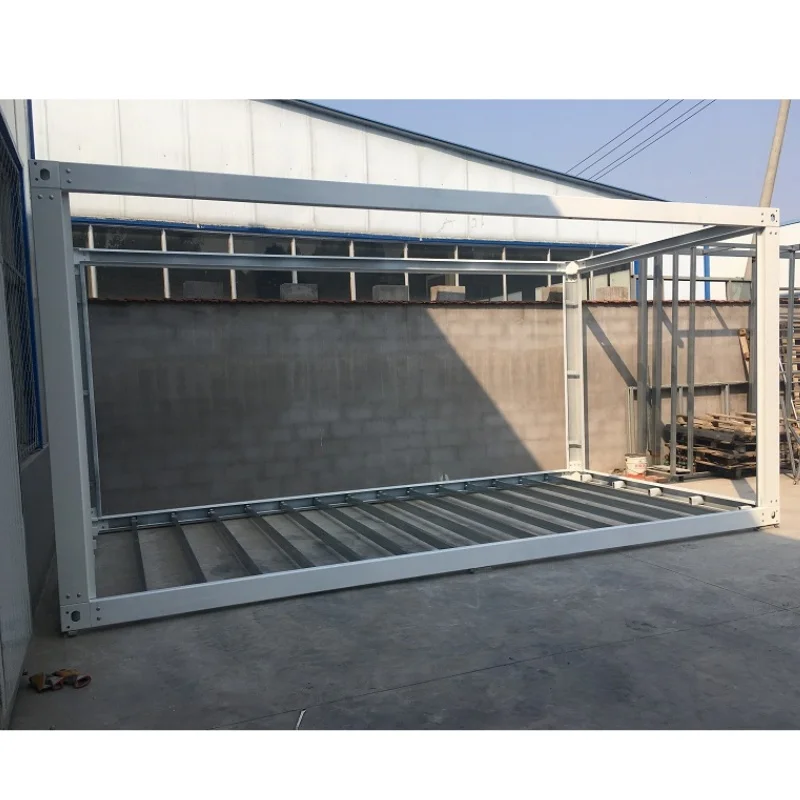Welcome To Laizhou Dingrong Steel Structure From China
Whatsapp:+8615192384158
The container frame is typically constructed from high-strength steel. It consists of a rigid framework that includes side rails, end frames, and cross members. The side rails run along the length of the container and provide longitudinal stability. The end frames, located at both ends, are designed to bear significant loads and stresses, especially during lifting and transportation. The cross members connect the side rails and end frames, distributing the weight evenly and enhancing the torsional rigidity of the structure. This carefully engineered combination of elements creates a robust and reliable framework that can withstand the rigors of global shipping and various environmental conditions.

The strength of the container frame is one of its most remarkable features. It is engineered to endure heavy loads, such as the weight of the cargo inside the container during transportation. This strength also makes it suitable for being repurposed into a wide range of structures, from simple storage units to elaborate residential or commercial buildings. The durability of the frame is enhanced by the use of corrosion-resistant coatings and treatments. Steel, although strong, is prone to rusting, especially in humid or salty environments. However, with proper protection, the container frame can maintain its integrity and functionality for many years. This durability factor is a significant advantage when considering the long-term viability of container-based projects.

One of the appealing aspects of the container frame is its adaptability. The basic structure can be easily modified to suit different purposes. For example, openings can be cut into the frame to install windows and doors, allowing for better ventilation and access. Interior partitions can be added to create separate rooms or functional areas. The frame can also be extended or combined with other container frames to create larger and more complex structures. This modifiability gives architects and builders great flexibility in designing unique and customized container-based solutions. Whether it's a small garden shed or a multi-story apartment building made from shipping containers, the container frame can be adjusted and customized to meet the specific requirements.
In its original context of shipping containers, the container frame is essential for safe and efficient transportation. The standardized dimensions and robust frame design allow for easy stacking and securing of containers on ships, trucks, and trains. The lifting points and corner fittings on the frame are specifically designed to interact with handling equipment, ensuring smooth loading and unloading operations. This compatibility with the global transportation infrastructure is what has made shipping containers so ubiquitous and has paved the way for their subsequent use in other industries and applications. The container frame's role in transportation is not only about moving goods but also about enabling the seamless movement of entire containerized structures when they are repurposed and relocated.
From a sustainability perspective, the container frame has a lot to offer. By reusing existing container frames in building projects, we are reducing the need for new construction materials and the associated energy consumption and carbon emissions. The recyclability of steel also means that at the end of its useful life, the frame can be recycled and used to produce new steel products. This closed-loop approach to material usage aligns with the principles of sustainable development and makes container frame-based constructions an environmentally friendly option. Additionally, the durability of the frame reduces the frequency of replacements and repairs, further minimizing the environmental impact over the long term.
In conclusion, the container frame is a remarkable and multi-faceted component. Its strength, durability, adaptability, role in transportation, and sustainable characteristics make it a cornerstone of the container architecture and shipping container conversion industry. Whether you are involved in shipping, construction, or simply interested in innovative building solutions, understanding the significance of the container frame is essential.
E-mail format is wrong

E-mail format is wrong
